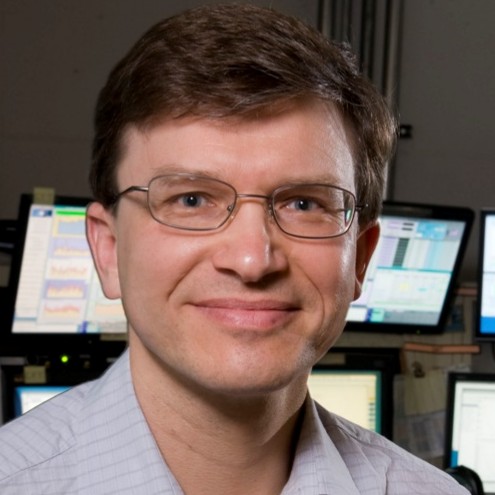
DMITRI DENISOV
Adjunct Professor
Physics and Astronomy
dmitri.denisov@stonybrook.edu | Brookhaven National Laboratory, Bldg. 703
Curriculum Vitae. (Last updated: 2023 Nov 21)
Biography
Dmitri Denisov graduated from Moscow Physical Technical Institute and joined Institute
for High Energy Physics (Protvino) where he performed a series of experiments at the
70-GeV proton accelerator for his Ph.D. research. He became a worldwide expert on
the development of new particle detectors for subnuclear physics experiments, including
fast coordinate detectors and calorimeters based on liquid argon. Denisov joined the
DZero collaboration at the Tevatron collider in 1987 and helped built a large, complex
particle detector to study the world’s highest-energy collisions of protons and antiprotons
at the Tevatron. In 1995, he played major role in Tevatron’s discovery of the top
quark, the heaviest elementary particle. In the late 1990s, his research led to the
precise measurements of bottom-quark production across a wide kinematic region, which
led to advances in the theoretical explanation of this process. Denisov oversaw major
part of the upgrade of the DZero detector in time for the start of Tevatron second
run, which began in 2001. He led successful commissioning of the DZero experiment
and readied it for physics data collection. From 2004 to 2006, he was the leader of
the electroweak physics group of the experiment, leading studies of the production
and properties of electroweak force carriers known as W and Z bosons. In 2006, Denisov
was elected spokesperson of the DZero collaboration, which comprises over 500 physicists
from 20 countries. He has led the collaboration to many exciting scientific results,
including the discovery of new heavy baryons containing bottom quarks, the highest-precision
measurements of the W boson and top quark masses, searches for a wide spectrum of
new subatomic phenomena predicted by theoretical models, and extensive hunt and then
studies of the Higgs boson. The DZero collaboration published more than 300 papers
during his term. Since 2015 Denisov is involved in developing physics program, accelerators
and detectors for future high energy colliders. In 2019 Denisov joint Brookhaven National
Laboratory to lead the laboratory particles physics program covering programs at energy,
intensity, cosmic and theory frontiers. In 2022 Denisov joined the Department of Physics
and Astronomy at Stony Brook University. Denisov serves on various advisory boards
in Americas, Europe, and Asia. Denisov received the Medal for achievements in high
energy physics and development of international cooperation from Czech Technical University
in 2008, he was elected Fellow of the American Physical Society in 2010 for his numerous
contributions to the development of experimental high energy physics and received
2019 European Physical Society prize for the discovery and studies of the top quark.
Research Statement
My interest and expertise are experimental particle physics with the goal of understanding
physics laws at the smallest possible distances and highest possible energies available
for experimental observations. I am also excited by developments of new detectors
for elementary particles and design and construction of large and complex detectors
used in modern particle physics. I am involved in a wide range of experiments at colliders,
studying neutrinos, and high precision experiments to measure properties of elementary
particles with extreme precision. Studies of Dark Matter and Dark Energy are among
my interests.
|
|
|


